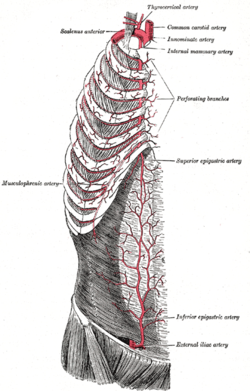Internal thoracic artery
| Internal thoracic artery | |
|---|---|

Right internal thoracic artery and its branches (labeled under its old name the Internal mammary artery, at upper right.)
|
|
| Details | |
| Source | Subclavian artery |
| Branches |
Pericardiocophrenic Anterior intercostal branches Musculophrenic Superior epigastric Perforating branches |
| Vein | Internal thoracic vein |
| Identifiers | |
| Latin | Arteria thoracica interna, arteria mammaria interna |
| MeSH | A07.231.114.891.525 |
| TA | A12.2.08.029 |
| FMA | 3960 |
|
Anatomical terminology []
|
|
In human anatomy, the internal thoracic artery (ITA), previously known as the internal mammary artery (a name still common among surgeons), is an artery that supplies the anterior chest wall and the breasts. It is a paired artery, with one running along each side of the sternum, to continue after its bifurcation as the superior epigastric and musculophrenic arteries.
The internal thoracic artery arises from the subclavian artery near its origin.
It travels downward on the inside of the ribcage, approximately a centimeter from the sides of the sternum, and thus medial to the nipple. It is accompanied by the internal thoracic vein.
It runs deep to the external oblique, but superficial to the vagus nerve
It continues downward until it divides into the superficial intercostal artery and the inferior epigastric artery around the sixth costal cartilage.
After passing the sixth intercostal space, the internal thoracic artery splits into the following two terminal branches:
The internal thoracic artery is the cardiac surgeon's blood vessel of choice for coronary artery bypass grafting. The left ITA has a superior long-term patency to saphenous vein grafts and other arterial grafts (e.g. radial artery, gastroepiploic artery) when grafted to the left anterior descending coronary artery, generally the most important vessel, clinically, to revascularize.
...
Wikipedia
